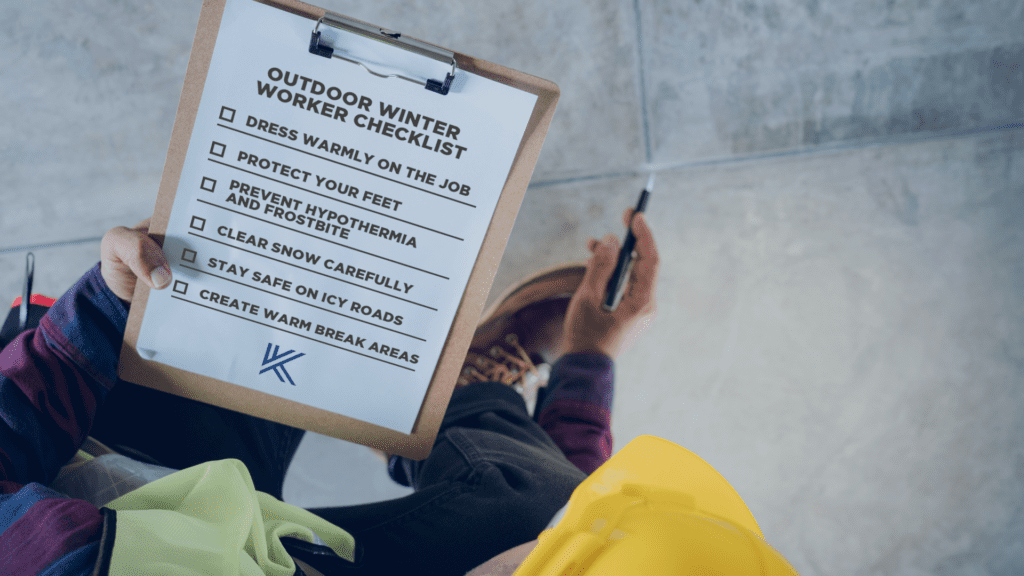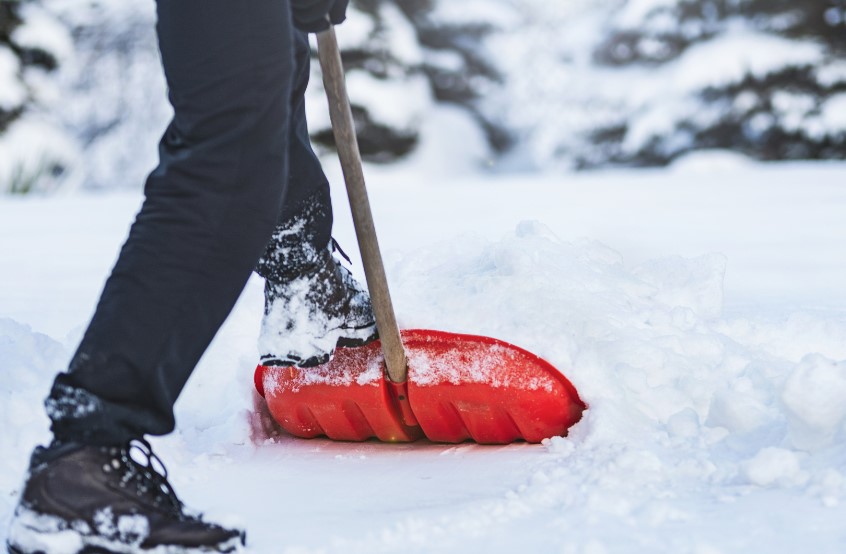

Outdoor work doesn’t stop because the temperature drops! During the winter months, outdoor workers can keep doing their job at a high level if they know how and when to protect themselves from the environment.
Read on to learn tips for outdoor workers to keep themselves safe during the winter – and share with the outdoor laborers in your life!
1. Dress Warmly on the Job
As temperatures fall, the risk of cold stress becomes a real concern for outdoor workers. Cold stress is different depending on where you live and what temperatures your body is used to, but in general, cold stress occurs when the body is no longer able to warm itself. Types of cold stress include trench foot, frostbite, hypothermia and chilblains.
To prevent the effects of cold stress, it’s essential to wear proper clothing. Layering not only provides insulation but allows for easy adjustment to changing weather conditions. Waterproof options or water-absorbing materials can help keep you dry, preventing heat loss through evaporation.
Another good rule to work by is that slowly getting more and more comfortable with the environment helps. When workers acclimatize gradually to cold environments, they can enhance their tolerance and reduce the risk of cold stress.


2. Take Steps to Protect Your Feet
Outdoor snow removal workers need to keep an eye on their feet. Special blood vessels in your feet open to allow large amounts of blood to pass through them—which makes your body heat quickly. In other words, keep your feet warm—keep your body warm.
Outdoor workers need their feet in good shape to be able to properly perform their job, so keeping their feet dry and warm is very important. Prioritize insulated, waterproof footwear. This not only protects against the cold but also guards against moisture, keeping feet dry and reducing the risk of frostbite. If your feet are colder than usual, it can affect your gait and cause problems for other parts of your body as you attempt to compensate for your aching feet! Cold feet can lead to frostbite and in colder months there isn’t much insulation coming from the ground.
A few other shoe details of note include their fit and traction. Poorly fitting shoes can lead to constriction that may impede circulation, while footwear with adequate traction minimizes the risk of slips and falls on icy surfaces.
3. Prevent Hypothermia and Frostbite
If you don’t take care of your feet, or any other part of your body for that matter, Frostbite and Hypothermia are the terrible consequences you could be facing. Hypothermia is caused by long-term exposure to cold temperatures, when your body loses heat faster than it’s produced. Frostbite is caused by a part of the body freezing. The part of the body turns numb so if someone else points it out to you, it is important to take action.
Outdoor workers need to prioritize wearing warm clothing and watching for any symptoms like shivering, confusion and slurred speech for hypothermia and red spots on the skin for frostbite.
4. Clear Your Snow Without the Risk
It’s unenviable, but inevitable. Snow will fall, and someone has to clear it out of the way so cars can drive on roads, pedestrians can walk on sidewalks and businesses can use their parking lots.
Plow drivers are out in force whenever there is a snowstorm, and they need to be careful on the roads. There is a lot to remember when taking to the roads during a snow storm or on icy roads when the roads are covered.
- Drive Slowly! The roads need to be plowed, but that doesn’t mean you need to drive fast.
- Maintain Your Vehicle. Make sure tires have plenty of tread and keep the gas tank at least halfway full.
- Slow To Stop. When roads are slick and your vehicle is heavy, it is hard to come to a quick stop. Slow to a stop or keep to a roll and avoid stopping if possible.
- Build Up Speed Before Climbing. Don’t try to ease or power up a hill, get inertia before beginning to go up the hill and let it carry you up, and whatever you do, don’t stop. This will lead to stopping or spinning tires.
When it comes to driveways and sidewalks where plows aren’t being used, first things first: people with a history of heart problems or aren’t regularly active should consult a health care provider before shoveling snow.
Whether you’re a small business owner wearing many hats or a worker responsible for snow removal, make sure you’re being safe. Moderation is key—take breaks, drink water, dress warmly.
In addition, save your back and muscles by using ergonomic shovels and push rather than lift snow whenever possible. Snow blowers are another option to help save yourself some pain, and time.


5. Stay Safe on Icy Roads
Winter months means water, ice and snow on the roads. If you have a job that requires a lot of winter travel, you need to know what to do in the event of poor conditions.
Before you drive anywhere, make sure you have performed any routine maintenance your car needs—including brakes, tires, car battery and more.
If you do run into trouble, you’ll thank yourself later if you’d prepared an emergency kit including things like blankets, non-perishable food and a flashlight.
Also, make sure you’re driving defensively by doing things like maintaining a safe distance when following other vehicles and adjusting speed based on conditions. In addition, check weather forecasts before you get behind the wheel.
6. Create Warm Break Areas
When working outside, you will adjust to the cold weather, but that won’t totally prevent the onset of cold stress, or even hypothermia or frostbite. Warm and waterproof clothes are a good start, but sometimes more is needed.
Part of acclimating to the cold weather is by slowly building up how long you can be in the weather. Especially initially, take regular and frequent breaks to slowly build up the tolerance for the cold!
Another good way to help outdoor workers warm up is by offering warm drinks in their outdoor workplace if possible.


Putting Safety First with Keches Law Group
Remember, winter brings its own set of challenges, but with the right knowledge and precautions, we can ensure a safer working environment for everyone. Stay warm and stay safe!
If you or someone you know has suffered an injury, explore our Personal Injury and Workers’ Compensation services. Contact Keches Law to discuss your case.




